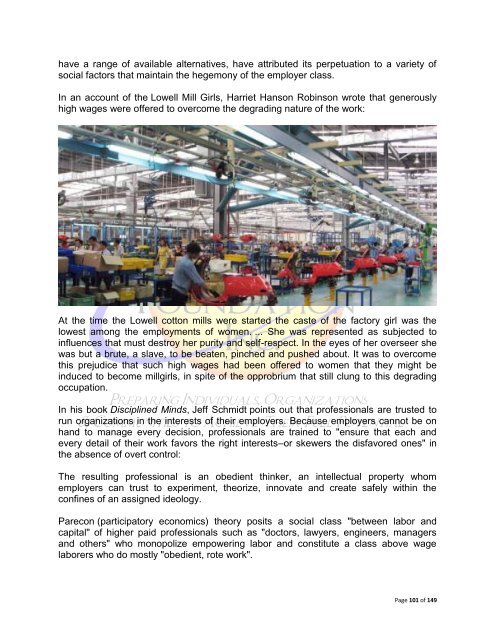Hidden Unemployment
Hidden Unemployment
Hidden Unemployment
You also want an ePaper? Increase the reach of your titles
YUMPU automatically turns print PDFs into web optimized ePapers that Google loves.
have a range of available alternatives, have attributed its perpetuation to a variety of<br />
social factors that maintain the hegemony of the employer class.<br />
In an account of the Lowell Mill Girls, Harriet Hanson Robinson wrote that generously<br />
high wages were offered to overcome the degrading nature of the work:<br />
At the time the Lowell cotton mills were started the caste of the factory girl was the<br />
lowest among the employments of women. ... She was represented as subjected to<br />
influences that must destroy her purity and self-respect. In the eyes of her overseer she<br />
was but a brute, a slave, to be beaten, pinched and pushed about. It was to overcome<br />
this prejudice that such high wages had been offered to women that they might be<br />
induced to become millgirls, in spite of the opprobrium that still clung to this degrading<br />
occupation.<br />
In his book Disciplined Minds, Jeff Schmidt points out that professionals are trusted to<br />
run organizations in the interests of their employers. Because employers cannot be on<br />
hand to manage every decision, professionals are trained to "ensure that each and<br />
every detail of their work favors the right interests–or skewers the disfavored ones" in<br />
the absence of overt control:<br />
The resulting professional is an obedient thinker, an intellectual property whom<br />
employers can trust to experiment, theorize, innovate and create safely within the<br />
confines of an assigned ideology.<br />
Parecon (participatory economics) theory posits a social class "between labor and<br />
capital" of higher paid professionals such as "doctors, lawyers, engineers, managers<br />
and others" who monopolize empowering labor and constitute a class above wage<br />
laborers who do mostly "obedient, rote work".<br />
Page 101 of 149

















